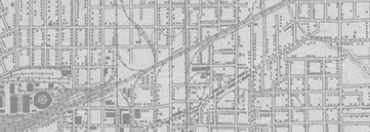


Back
Photograph of courtroom sketch of Barney Ross testifying during Ruby trial
Photograph of courtroom pencil sketch on paper by CBS News courtroom artist Howard Brodie. The sketch shows witness Barney Ross during the Jack Ruby trial on March 09, 1964. The sketch shows Ross seated in the witness stand wearing glasses with his hands clasped in front of him. A microphone is positioned in front of him. In front of the witness stand is a seated man, likely a courtroom reporter, taking notes. Handwritten captions along the top edge of the image respectively read "'wouldn't step on fly or caterpillar' Ruby" and "Barney Ross." The date "3/9/64" is written in the lower right corner. Brodie made the original pencil sketches for CBS News during the trial of Jack Ruby after the judge barred cameras from the courtroom. Brodie then gave Joe Tonahill this photograph of a courtroom sketch as part of a collection of more than 40 in 1964.
Photograph of courtroom sketch of Barney Ross testifying during Ruby trial
03/09/1964
Paper
14 1/2 × 19 5/16 in. (36.8 × 49.1 cm)
Tonahill Family Partners Collection/The Sixth Floor Museum at Dealey Plaza
2014.034.0025
Howard Brodie (1915-2010) was a sports artist for the San Francisco Chronicle when he enlisted in the U.S. Army with America's entry into World War II. He ultimately became one of the best-known sketch artists of the war, frequently published in the weekly U.S. military magazine, Yank, which ran from June 1942 to December 1945. After the war, Brodie spent the next thirty-five years as a courtroom artist, attending several notable trials including the Chicago Seven, Charles Manson and, of course, the Jack Ruby trial in 1964. For the Ruby trial, Brodie worked as a CBS-TV artist correspondent. Mr. Brodie recorded an oral history with the Museum in 2006. -- Stephen Fagin, Curator
Dov-Ber David Rosofsky, aka Barney Ross (1909-1967), was a world champion boxer in three weight divisions. He won 72 of his 79 fights, including 22 knockouts. Although his last fight was in 1938, Ross remained relevant at the time of the Jack Ruby trial in 1964. He had been the subject of a 1957 biographical feature film, Monkey on My Back, that depicted his boxing career and World War II heroism as well as his subsequent addiction to opiates. Distributed by United Artists, the film was somewhat controversial since it was released without the Production Code seal of approval (due to a scene involving a hypodermic needle being inserted into a character's arm). By the time of the Ruby trial, and for the remaining three years of his life, Ross primarily did promotional work. He testified as a character witness on Ruby's behalf and generated even more publicity for the already high-profile trial. Ross died on January 17, 1967, exactly two weeks after his friend, Jack Ruby. -- Stephen Fagin, Curator
Photograph of courtroom sketch of Barney Ross testifying during Ruby trial
Photograph of courtroom pencil sketch on paper by CBS News courtroom artist Howard Brodie. The sketch shows witness Barney Ross during the Jack Ruby trial on March 09, 1964. The sketch shows Ross seated in the witness stand wearing glasses with his hands clasped in front of him. A microphone is positioned in front of him. In front of the witness stand is a seated man, likely a courtroom reporter, taking notes. Handwritten captions along the top edge of the image respectively read "'wouldn't step on fly or caterpillar' Ruby" and "Barney Ross." The date "3/9/64" is written in the lower right corner. Brodie made the original pencil sketches for CBS News during the trial of Jack Ruby after the judge barred cameras from the courtroom. Brodie then gave Joe Tonahill this photograph of a courtroom sketch as part of a collection of more than 40 in 1964.
Photograph of courtroom sketch of Barney Ross testifying during Ruby trial
03/09/1964
Photographs
Jack Ruby trial
Sketches
Testimony
Witnesses
Trials
Artist
Artwork
Brodie, Howard
Ross, Barney
Ruby, Jack
CBS News
Dallas
Paper
14 1/2 × 19 5/16 in. (36.8 × 49.1 cm)
Tonahill Family Partners Collection/The Sixth Floor Museum at Dealey Plaza
2014.034.0025
Howard Brodie (1915-2010) was a sports artist for the San Francisco Chronicle when he enlisted in the U.S. Army with America's entry into World War II. He ultimately became one of the best-known sketch artists of the war, frequently published in the weekly U.S. military magazine, Yank, which ran from June 1942 to December 1945. After the war, Brodie spent the next thirty-five years as a courtroom artist, attending several notable trials including the Chicago Seven, Charles Manson and, of course, the Jack Ruby trial in 1964. For the Ruby trial, Brodie worked as a CBS-TV artist correspondent. Mr. Brodie recorded an oral history with the Museum in 2006. -- Stephen Fagin, Curator
Dov-Ber David Rosofsky, aka Barney Ross (1909-1967), was a world champion boxer in three weight divisions. He won 72 of his 79 fights, including 22 knockouts. Although his last fight was in 1938, Ross remained relevant at the time of the Jack Ruby trial in 1964. He had been the subject of a 1957 biographical feature film, Monkey on My Back, that depicted his boxing career and World War II heroism as well as his subsequent addiction to opiates. Distributed by United Artists, the film was somewhat controversial since it was released without the Production Code seal of approval (due to a scene involving a hypodermic needle being inserted into a character's arm). By the time of the Ruby trial, and for the remaining three years of his life, Ross primarily did promotional work. He testified as a character witness on Ruby's behalf and generated even more publicity for the already high-profile trial. Ross died on January 17, 1967, exactly two weeks after his friend, Jack Ruby. -- Stephen Fagin, Curator









